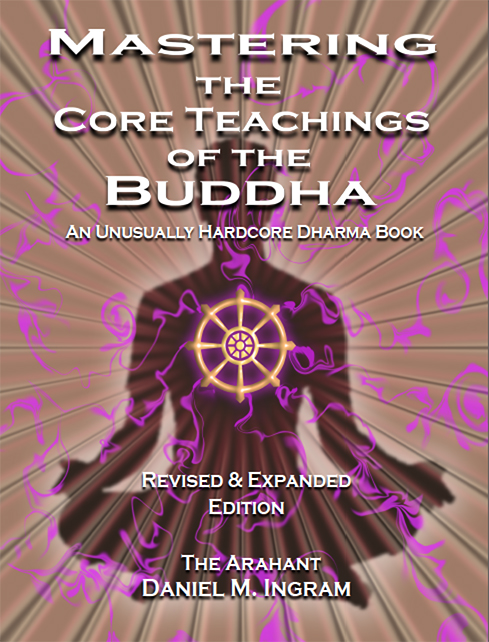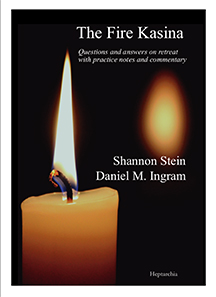The Action Models
← The Simple Model | The Perfect Speech Models →
The action models tend to involve certain actions that awakened beings cannot commit or must commit. Both types of models are completely ridiculous, and so we come now to the first of the models that simply have no basis in reality. The traditional Theravada models contain numerous statements that are simply wrong about what an awakened being cannot do or will do. My favorite examples of this include statements that arahants cannot break the precepts (including killing, lying, stealing, having sex, doing drugs, or drinking), cannot become sexually aroused, cannot have jobs, cannot be married, and cannot say they are arahants. They also state that unordained arahants must join the Theravada monastic order within days of their realization or they will die. Needless to say, all are simply absurd lies, lies that have unfortunately often been perpetuated by arahants.
There is also another subtler and more seductive view, which is that awakened beings somehow will behave in a way that is better or higher, though they won’t define what those actions might be or what actions they might avoid. I consider this view exceedingly dangerous. While I wish to promote the shift in perception that I call awakening and other names, I don’t want to imply that somehow this will save anyone from stupid actions or make them always aware of how to do the right thing or avoid screwing up. Such views are a set-up for massive delusion and huge shadow sides, as anyone who has spent enough time in any spiritual community knows all too well. As a Zen expression says, “The bigger the front, the bigger the back,” and this particular view can give you a shadow side the size of Texas.
The list is remarkably long of awakened individuals who have bitten the proverbial dust by putting themselves up on a pedestal, hypocritically violating their own lofty ideals of behavior, and then having been exposed as actually being human. The list of spiritual aspirants who have failed to draw the proper conclusions from the errors of the awakened is even longer. That so many intelligent individuals have such a hard time sorting all this out, instead putting a spin on, rationalizing, enabling, justifying, protecting, and defending the often dangerous behavior of countless teachers and spiritual leaders is truly mind-boggling, until you consider its parallels in the leadership that countries with the capacity to end most life on the planet choose for themselves, and suddenly it is less surprising. There are many schools of thought on this issue, and I will give them formal names here, though in reality, they don’t think of themselves this way.
“The partway up the mountain school” essentially believes, “Those who screwed up and caused a scandal were only halfway up the mountain, only partially awakened, as anyone who is really awakened couldn’t possibly have done those terrible things.” While clearly some were only partially enlightened, or perhaps not enlightened at all in the technical sense, a number who screwed up clearly knew and know ultimate reality inside and out, and so this model misses many important points.
“The crazy wisdom school” believes that “Enlightened beings transcend conventional reality and with it conventional morality and causality, so they are the natural manifestation of a wisdom that seems crazy to us foolish mortals but is really a higher teaching in disguise!” While not entirely absurd, as there are many cultural aspects and societal norms that can seem a bit childish, artificial, unnecessary, unhelpful, or naive in the face of realization, the crazy wisdom school provides too easy an excuse for plenty of behavior that has been and is just plain wrong, irresponsible, stupid, exploitative, reckless, hurtful, delusional, narcissistic, inconsiderate, juvenile, depraved, vile, and needlessly destructive.
Then there is my school, for which I have yet to come up with a catchy name, but perhaps we could call it “the reality school”, and it promotes the view that, “Awakened beings are human, and unfortunately humans, enlightened or otherwise, whose brains contain a thin veneer of civilization retrofitted over a much larger, more ancient, more primal (lizard) brain, all screw up at times. There is nothing special or profound about this.” In short, this school categorically rejects the specific lists and dogmas of the traditional action models in all forms, from the preposterous lists of the Theravada to the subtle sense that enlightened beings somehow are guaranteed to act in “enlightened” ways perpetually, whatever those are. It also rejects the rationalizations of the crazy wisdom schools.
That said, the ability to see things as they are does allow for the possibility of more measured and intelligent responses to situations and emotions, as stated earlier. That is a very different concept from coming up with a list of actions that enlightened beings never would or could do, and it certainly doesn’t mean they will necessarily act the way we think they will or that theirs will always be the right or best action, from our perspective. Further, while this is not an exhaustive list, the behavior of any being is always affected by the following:
• the standard laws of the natural world;
• the limits of their level of realization;
• the ingrained habits of the realized individual, including personality quirks and “stuff”;
• the residue of and/or shadow sides of the techniques and traditions they used to attain their understanding (don’t underestimate these!);
• the fact that mindfulness waxes and wanes (at least in arahants, those below arahantship, and in all realistic definitions of Buddhas);
• the fact that confusion and stupidity can still occur very much as before;
• the limits of the relative knowledge and experiences of the realized individual;
• the psychological and physiological issues that apply to the brain and body of the realized individual;
• their cultural upbringing and the social conventions and mores created by it.
You will notice that this is quite a realistic list. Thus, the dogmas of the standard action models, while containing a few grains of truth, are simply wildly inaccurate, and generally represent some of the most questionable of the models of enlightenment.
A closely related issue involves the tensions between the “technically enlightened” models and the limited possible action models. There are schools of thought that say, “One enlightened action and one is a Buddha, one deluded action and one is an ordinary human being.” These have their value from a certain behavioral point of view, and can serve as a valuable reminder that conventional morality tends to be an extremely good idea most of the time. I, for one, think that everyone, regardless of purported realizations or lack thereof, should be held to a high and universal, non-harming, ethical standard, though in some humane, just, inclusive, and forgiving way. However, teachings based on some arbitrary ideal called “enlightened action” can begin to diminish the importance of direct realization of the truth of things and reinforce the mythical residue of the limited possible action models of realization.
There are those who are “technically” unenlightened (meaning that they have never completed even one progress of insight or attained to any direct understanding of emptiness or non-duality) who nonetheless live lives that would be considered unremittingly exemplary and even saintly by the very highest standards of human generosity, compassion, and conduct. I have been fortunate enough to meet and work with a few of these people and continue to stand in awe of them. Just so, there are those who are “technically” awakened, who nonetheless can appear exceedingly ordinary, seem to be of distinctly questionable character, disposition, and moral virtue, or seem sometimes downright debauched, nasty, and insufferable. I have met a good number of these, and that I have met more of them than I have those I would consider truly saintly leads me to the data-driven conclusion that it is easier to master insight practices than to master ethical and kind behavior. I say this not to excuse anyone but just to point out that we should all continue to strive to be moral people, and this is evidenced in our behavior with one another.
While the failure of the limited or enlightened action models and limited emotional models is a huge disappointment from one point of view, it also means that there is hope for the rest of us. Our lives are it, our emotions are it, our habits are it, our limitations are it, our neuroses are it, our issues are it, and our shadow sides are it. How can we attain understanding if we do not see clearly into reality as it is? How can we see clearly into reality as it is if we spend most of our time thinking that it isn’t good enough to examine reality clearly?

